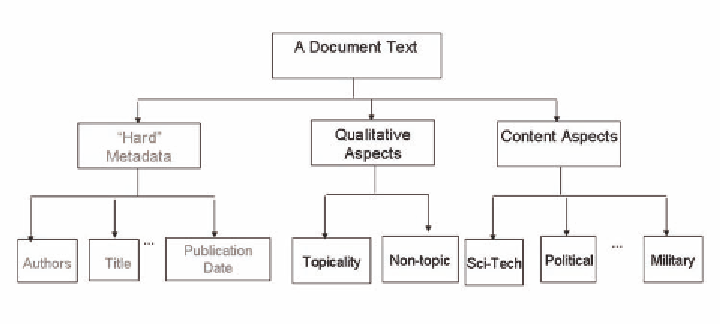Information Technology Reference
In-Depth Information
Figure 1. Text properties
quest rePresentAtion
We call these properties of text, such as
level of difficulty, reliability of the sources of
information, authoritativeness of content, etc.,
QualitativeAspects (QAs)
for two reasons. First,
these properties are usually associated with the
“quality” of a text. Second, these properties do
not have generally accepted quantitative methods
by which to represent them, yet. (Ng, et al, 2003,
Tang, et al, 2003)
Content aspects
are other dimensions by
which texts about same topics can be differentiated.
We use the concept of Content Aspects (CAs) to
refer to some broad perspectives in the texts of
the problem. To give an immediate example, a
discussion of “Syrian military capability” might
appear in an article that is primarily concerned with
technology issues, primarily concerned simply
with comparison of military forces, or primar-
ily concerned with an assessment of an overall
political situation. Depending on the nature of
an analyst's request the distinction between these
three might, or might not, be of great importance
in deciding which quests should be reused.
We propose a collaborative search system
(Figure 2) taking the existing framework of
AntWorld system, an example of query recom-
mendation system). In AntWorld, when a new
user of the system, represented as “You” in the
diagram, begins a quest, you examine documents
What to represent
As shown in Figure 1, a collection of texts can
be represented in many ways in an information
system. Generally these ways include metadata,
which are “externally known” properties of texts,
and the topic or content of texts. In current sys-
tems, topical relevance is basically the only text
property that is used to retrieve and rank texts.
However, the differences between texts are not
only topical. Studies of users' information need
or relevance judgments (Barry 1994; Bruce 1994;
Saracevic 1975, 1996; Vickery, et al 1987) have
shown that users distinguish between texts on the
same topic, and such non-topical differences are
also crucial to the selection of relevant texts. For
example, considering a query about the “North
Korea Nuclear weapons problem”, different users
will require texts that assume different levels of
expertise, depending on the users' backgrounds.
Many basic introductory texts should not be
delivered to an intelligence analyst who tracks
information about this problem daily. Meanwhile,
depending on the tasks at hand, the analyst may
require objective texts that represent the latest news
about the issue, or subjective texts that contain
the opinions about the problem.

Search WWH ::

Custom Search